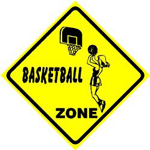“You’re always going to face criticism, you’re always going to face challenges, but those things are there to make you stronger and more committed” – David Robinson
 Athletes have a responsibility to keep themselves as mentally sharp as they do physically.
Athletes have a responsibility to keep themselves as mentally sharp as they do physically.
In fact, research on sports psychology for basketball shows that the way an athlete thinks has a greater impact on their performance than any other factor.
Here are five mental obstacles for athletes to be aware of when they practice and play their sport. It is also important to know how these obstacles can negatively impact performance your basketball mental toughness:
Fear of failure – It’s very easy for an athlete to question themselves and to fear the negative outcomes that may occur. We call this a “what if” line of thinking.
They may think, “What if I wind up losing the game for the whole team?” or “what if I don’t get drafted or signed by a professional team?” This line of thinking can creep up while you are performing, which can have a significantly negative influence on your results.
This fear of failure can cause performance anxiety and create discomfort. Rather than playing to the best of your ability, you will wind up with a form of mental paralysis, leaving you unable to take effective action.
Caring too much about what others think – Athletes often look for approval from their teammates, coaches, families and friends. However, if you want to succeed you have to look within.
Athlete lose confidence as they’re often preoccupied with what others think of them. In the long-term, their happiness and sense of personal efficacy becomes dependent on the approval of others, and as such, is very volatile. They may not realize that they’re basing their happiness and performance on something they have absolutely no control over.
Bringing our personal problems onto the court – Athletes often allow outside distractions to influence their play on the court. Emotions are a natural part of our lives, but by bringing baggage onto the court will affect how you play. You will become distracted during the game, miss out on important plays or trip up at crucial moments in the game.
When you are not completely focused on the task at hand, your performance suffers. This can cause uncharacteristic mistakes and a tendency to become aggravated toward other players and beat yourself up after the game is over.
Getting caught up in past experiences -Many athletes fail to see that past experiences are not necessarily an indicator of future performance. For example, a team may believe that they can’t defeat specific opponents because they’ve lost to them before, even if they are equally talented. The same can be said for individual performance; just because one may have failed in the past does not mean they will fail in the future.
When you get caught up in your negative past experiences, you fuel self-doubt. Self-doubt leads to poor performance. Holding on to negative past experiences can stop you from moving forward and improving your mental game.
Lack of confidence – Confidence is a mindset. It is also a tool that allows an athlete to exceed expectations. Unfortunately, some athletes allow negative self-talk to abolish their basketball confidence. They compare themselves to the other players with thoughts like, “they’re better than me,” “they’re more experienced,” “they’re faster,” or “there is no way I’m going to win.”
Lacking confidence can not only damage an athlete’s performance, but it can take its toll on their personal well-being. Some athletes waste days, weeks, or even months worrying about their deficiencies, and bring themselves to a state of unproductive anxiety.
These five obstacles are super common among athletes, but you can overcome them.
It all starts with your thoughts and what it is you are focusing on.
Remember, what you focus on grows.
*Download the free mental game assessment and get started on Improving your Mental Game in Basketball
